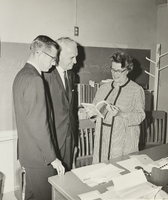Pioneering Research
Zedler realized that there was a need for clinical research into learning disabilities, and her interest in pursuing that research led to one of the university's first federal research grant applications. This research "addressed the provocative question of why obviously intelligent children were failing in school. The thought was that, if the problem could be identified, it could be prevented." However, Zedler noted that "When that first research was no more than completed, we realized that it was not what caused the disability that was important but rather what could be done to correct it."
Writing and reading are but substitutes for speaking and understanding speech. Therefore, therapists trained to diagnose and treat speech disorders should be competent to diagnose and treat reading and writing disorders. It is this philosophy that has brought us these research grants.
— Dr. Empress Zedler
Research Grants
In the mid-1950s Zedler secured multiple grants from the Texas-based Hogg Foundation for Mental Health. By the early 1960s she brought some of the University's first federal research grants to the Speech-Language-Hearing clinic.
-
1963: $38,916 from the Public Health Service division of the U.S. Department of Health, Education and Welfare
This grant funded research in methods for early detection of children with normal intelligence who were underachieving in school because of language problems
-
1964: $158,337 from the U.S. Department of Health, Education and Welfare's Education Department
The purpose of this grant was to study methods of teaching children with neurological disorders that affected reading, writing, and speech.
-
1972: $105,600 from the U.S. Department of Health, Education, and Welfare's Bureau of Education of the Handicapped
A three-year grant, which was used primarily for graduate scholarships to train teachers specializing in communication disorders.
Computers in Research
Zedler's second research project generated complex data that required the use of a computer to tabulate and interpret. Since computing was still a new field in 1964 and Texas State didn't have enough resources to assist her, Dr. Zedler traveled to the University of Wisconsin 13 times to confer with statisticians and transfer data that needed to be analyzed by their university computer.
